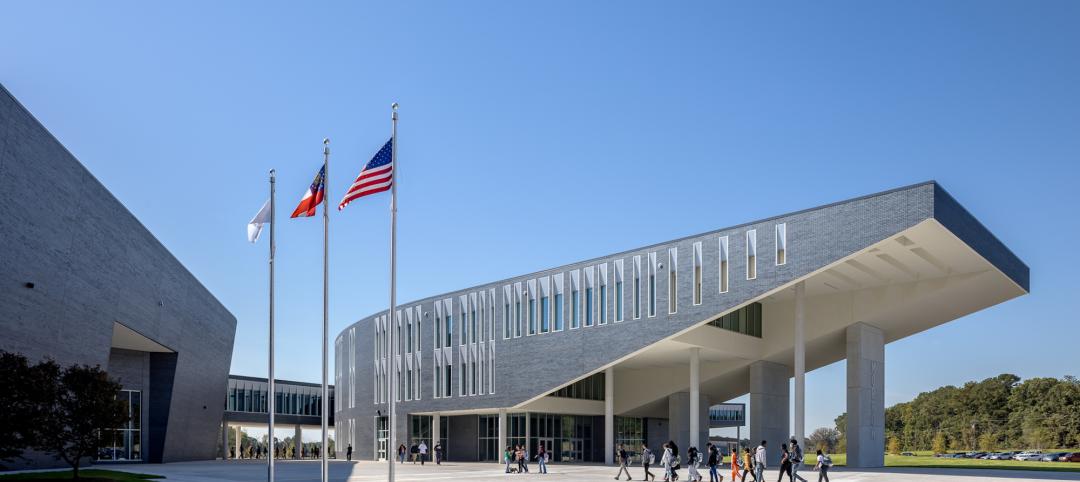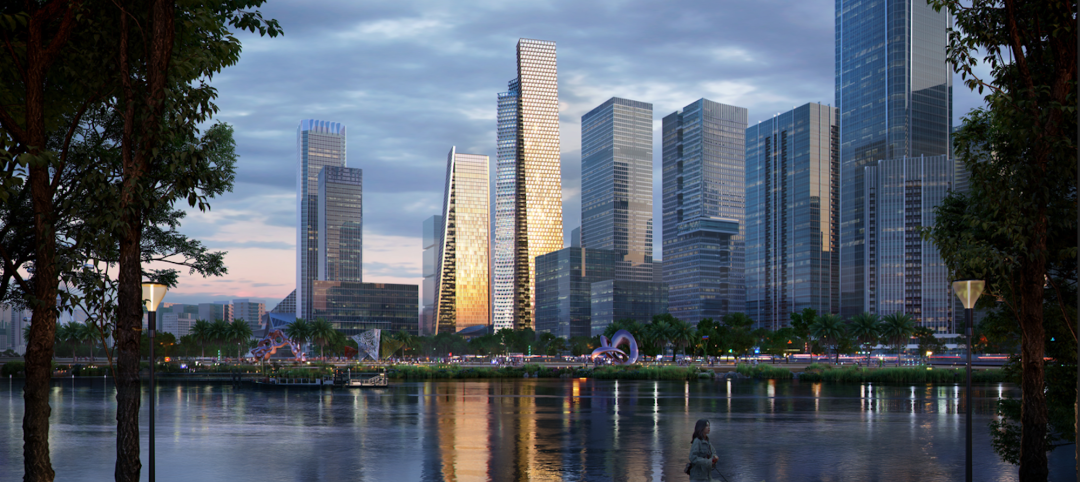The American Institute of Architects (AIA) today announced publication of 2030 by the numbers, the 2016 progress report assessing the work of architecture firms that are part of the AIA 2030 Commitment, a voluntary initiative to commit their practices to advancing the AIA’s goal of carbon-neutral buildings by the year 2030. The report is available and can be viewed here.
The 2030 Commitment represents a key part of the AIA membership's dedication to combating climate change, particularly with the recent U.S. withdrawal from the Paris Agreement. Despite that withdrawal, firms that sign on to and actively participate in the 2030 Commitment continue to directly support the goals of the climate accord, as part of the AIA's position that architects can—and should—mitigate the effects of climate change through policy advocacy, education, and energy modeling.
Key takeaways from the 2016 Progress Report:
- Projects reported an average predicted energy use intensity (pEUI) savings of 42 percent in 2016, climbing from 38 percent in 2015 and continuing the steps forward that the 2030 Commitment has taken over the last few years.
- The AIA 2030 energy target of 70 percent predicted energy savings is ambitious but achievable. In 2016 six firms achieved a portfolio-average predicted energy savings of 70 percent or greater, and 331 individual projects also met or exceeded this target.
- In 2016, the number of reporting firms grew 15 percent to 205. Additionally, with 53 new firms signing on to the Commitment, the overall number of signatories now totals more than 400.
- The potential energy savings from all 2016 projects represent approximately 16.7 million metric tons of greenhouse gas emissions - the equivalent of running almost five coal-fired power plants or powering 1.76 million homes for a year (EPA Greenhouse Gas Equivalencies Calculator).
- AIA data continues to demonstrate that energy modeling is an essential component of success, with modeled projects averaging pEUI reductions of just over 50 percent, as compared to only a 35 percent pEUI reduction for projects that were not modeled. However, as the share of modeled projects declined from 2015, more work is needed to better incorporate energy modeling across the profession.
Since 2009, participants in the AIA 2030 Commitment have reported the performance of their architecture firm portfolios over each calendar year. The data, collected via the 2030 Design Data Exchange (DDx), includes building type, area, baseline energy performance, and predicted energy performance. Among the data points reported are firm participation, total area of number of projects reported, percentage of projects that used energy modeling, and overall progress toward the 2030 goals.
Related Stories
K-12 Schools | Feb 18, 2023
Atlanta suburb opens $85 million serpentine-shaped high school designed by Perkins&Will
In Ellenwood, Ga., a southeast suburb of Atlanta, Perkins and Will has partnered with Clayton County Public Schools and MEJA Construction to create a $85 million secondary school. Morrow High School, which opened in fall 2022, serves more than 2,200 students in Clayton County, a community with students from over 30 countries.
Museums | Feb 17, 2023
First Americans Museum uses design metaphors of natural elements to honor native worldview
First Americans Museum (FAM) in Oklahoma City honors the 39 tribes in Oklahoma today, reflecting their history through design metaphors of nature’s elements of earth, wind, water, and fire. The design concept includes multiple circles suggested by arcs, reflecting the native tradition of a circular worldview that encompasses the cycle of life, the seasons, and the rotation of the earth.
Architects | Feb 17, 2023
Architect of the Capitol fired by President Biden after strong bipartisan criticism
Architect of the Capitol J. Brett Blanton was let go this week following alleged abuse of authority, misuse of government property, and wasted taxpayer money.
High-rise Construction | Feb 15, 2023
Bjarke Ingels' 'leaning towers' concept wins Qianhai Prisma Towers design competition
A pair of sloped high-rises—a 300-meter residential tower and a 250-meter office tower—highlight the Qianhai Prisma Towers development in Qianhai, Shenzhen, China. BIG recently won the design competition for the project.
Senior Living Design | Feb 15, 2023
Passive House affordable senior housing project opens in Boston
Work on Phase Three C of The Anne M. Lynch Homes at Old Colony, a 55-apartment midrise building in Boston that stands out for its use of Passive House design principles, was recently completed. Designed by The Architectural Team (TAT), the four-story structure was informed throughout by Passive House principles and standards.
Designers | Feb 13, 2023
Hoffmann Architects + Engineers Establishes Diversity Advancement Scholarship Fund
Hoffmann Architects + Engineers, a design firm specializing in the rehabilitation of building exteriors, contributed $25,000 to fund the Hoffmann Diversity Advancement Scholarship, administered through the Connecticut Architecture Foundation. The fund provides scholarships for students from underrepresented racial or ethnic groups who are seeking degrees in architecture or engineering.
Office Buildings | Feb 12, 2023
Smyrna Ready Mix’s new office HQ mimics the patterns in the company’s onsite stone quarry
Designed by EOA Architects to showcase various concrete processes and applications, Smyrna Ready Mix's new office headquarters features vertical layering that mimics the patterns in the company’s stone quarry, located on the opposite end of the campus site. The building’s glass and concrete bands are meant to mirror the quarry’s natural contours and striations.
Multifamily Housing | Feb 11, 2023
8 Gold and Platinum multifamily projects from the NAHB's BALA Awards
This year's top BALA multifamily winners showcase leading design trends, judged by eight industry professionals from across the country.
Multifamily Housing | Feb 10, 2023
Dallas to get a 19-story, 351-unit residential high-rise
In Dallas, work has begun on a new multifamily high-rise called The Oliver. The 19-story, 351-unit apartment building will be located within The Central, a 27-acre mixed-use development near the Knox/Henderson neighborhood north of downtown Dallas.
Sustainability | Feb 9, 2023
New guide for planning, designing, and operating onsite water reuse systems
The Pacific Institute, a global nonpartisan water think tank, has released guidance for developers to plan, design, and operate onsite water reuse systems. The Guide for Developing Onsite Water Systems to Support Regional Water Resilience advances circular, localized approaches to managing water that reduce a site’s water footprint, improve its resilience to water shortage or other disruptions, and provide benefits for local communities and regional water systems.

















